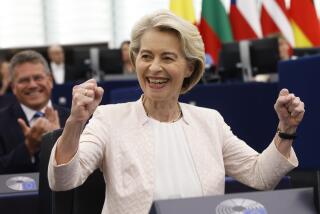COMMON MARKET : EC Architect Delors Likely to Keep Post Despite Danish Veto
- Share via
LISBON — Six months ago, Western European leaders came together to orchestrate the economic and political unification of their continent. Today they meet again, this time to try to keep it from flying apart.
To manage the task, they are prepared to turn again to the man who deserves the credit for taking them as far as they have gone--but who also shoulders some of the blame for their current predicament.
Jacques Delors, president of the EC’s policy-formulating commission, is the prime architect of the last eight years of European unity.
It was Delors who dreamed up “EC ‘92,” the short-hand name for the effort to blend the 12 EC nations into a single economic market. By year’s end, the EC will have brought down most of the barriers to the movement of goods, services, money and people.
And it was under Delors’ firm hand that leaders of the 12 EC nations met in the Dutch town of Maastricht last December to sign a far-reaching treaty for European union. The Maastricht Treaty, far more ambitious even than EC ‘92, called for a common European currency by 1999 and established procedures for reaching joint EC policy on everything from foreign affairs to factory working conditions.
But on June 2, tiny Denmark blew a large hole in a united Europe when its electorate, by a margin of fewer than 50,000 votes, refused to ratify the Maastricht Treaty. The EC constitution requires ratification by all 12 members. Maastricht’s complex fabric threatened to unravel.
Inevitably, fingers pointed at Delors for turning Danish public opinion against anything that smacked of greater power for the EC bureaucracy in Brussels, at the expense of its member nations.
Indeed, an option paper prepared by Delors’ staff had suggested that the EC’s smaller members--and Denmark is the third-smallest--might have to yield power as more nations joined the community. The staff had told British reporters much the same thing.
Yet now, as EC leaders prepare for their first summit since their historic meeting in Maastricht last December, Delors appears all but certain to win another two-year term at the EC helm. He is widely regarded, even by skeptical Danes, as the one man with the vision to whip the EC into a world-class economic and diplomatic force. Besides, there are no other active candidates to take over when his term expires at the year’s end.
Only the British have stayed off the Delors bandwagon, although Prime Minister John Major told Parliament on Thursday that if the incumbent is the only candidate, “we shall accept him.”
For Delors, 66, another two years in Brussels would position him nicely to run for France’s presidency when the seven-year term of incumbent Francois Mitterrand expires in 1995.
With Mitterrand’s popularity sagging, Delors has become one of his country’s most popular politicians by remaining above the rough-and-tumble of domestic politics. A Socialist who served as Mitterrand’s finance minister in the early 1980s, he built a reputation as a pragmatist who ushered in a decade of prosperity by steering France away from central economic planning and toward free-market policies.
It was a humbler Delors who emerged from Denmark’s rejection of the Maastricht Treaty.
But signs are already emerging of future clashes between Delors and the British, who, as luck would have it, take over the rotating presidency of the EC from the Portuguese in the second half of this year.
The British, in a position to shape the EC agenda, intend to launch the process of enlarging the Community to include Sweden, Finland, Austria and Switzerland. Leery of yielding sovereignty to Brussels, the British hope that the EC’s powers cannot be deepened to include such areas as security policy at the same time that the Community is being widened.
More to Read
Sign up for Essential California
The most important California stories and recommendations in your inbox every morning.
You may occasionally receive promotional content from the Los Angeles Times.










